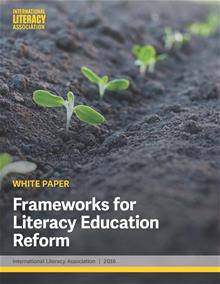ILA developed Frameworks for Literacy Education Reform in response to today’s complex and evolving education landscape. With an increase in English learners, high-stakes testing, and digital technologies driving new modes of teaching and learning, challenges for the classroom teacher are mounting. The new white paper’s frameworks serve as a high-level rubric that school administrators and policymakers can use to create or assess reform proposals. In this blog series, we’ll take a closer look at each of the frameworks.
 If the classroom has a foundation, it is the teacher. Much is said about teacher preparation, about recruiting the right talent, and keeping talented teachers in the field. This framework focuses on what needs to be done to make literacy educators successful.
If the classroom has a foundation, it is the teacher. Much is said about teacher preparation, about recruiting the right talent, and keeping talented teachers in the field. This framework focuses on what needs to be done to make literacy educators successful.
Frameworks for Literacy Education Reform notes there must be more focus on literacy education at “every level of study during coursework and clinical practice.” This focus must also hone in on 21st-century strategies.
Teachers’ education and development does not end, however, once they get into the classroom.
D. Ray Reutzel, Dean of the College of Education, University of Wyoming, and co-chair of the white paper project, said one of the most important tools teachers need, from confidence to classroom strategies, is support from fellow teachers.
“Once teachers get into the classroom, they’re often asked to disavow what they just learned in their training and it disturbs their equilibrium,” Reutzel said. “We haven’t taken seriously how we assign preservice internships, service, or alignment in order to prepare professionals.”
He added that often student teachers are placed simply because a school is willing to take them in. And although more experienced teachers are prepared to teach children, they are not necessarily prepared to teach teachers. This is where a literacy coach is most useful.
Continuous professional development is crucial to success in the classroom, the team of researchers noted, and an environment of collaboration and empowerment.
A critical success factor for ongoing teacher support and development is implementing an evaluation system that focuses on having criteria that are consistent, systematic, and research based and that are implemented ethically and effectively.
“There are an awful lot of teachers doing a good job and should be recognized and commended,” Reutzel said. “This paper is responding to critics of those who are not as effective in the classroom. The goal is for all teachers to be armed with the right tools to be successful literacy educators.”
The complete white paper, Frameworks for Literacy Education Reform, can be found here.
April Hall is editor of Literacy Daily. A journalist for 20 years, she has specialized in education, writing and editing for newspapers, websites, and magazines.